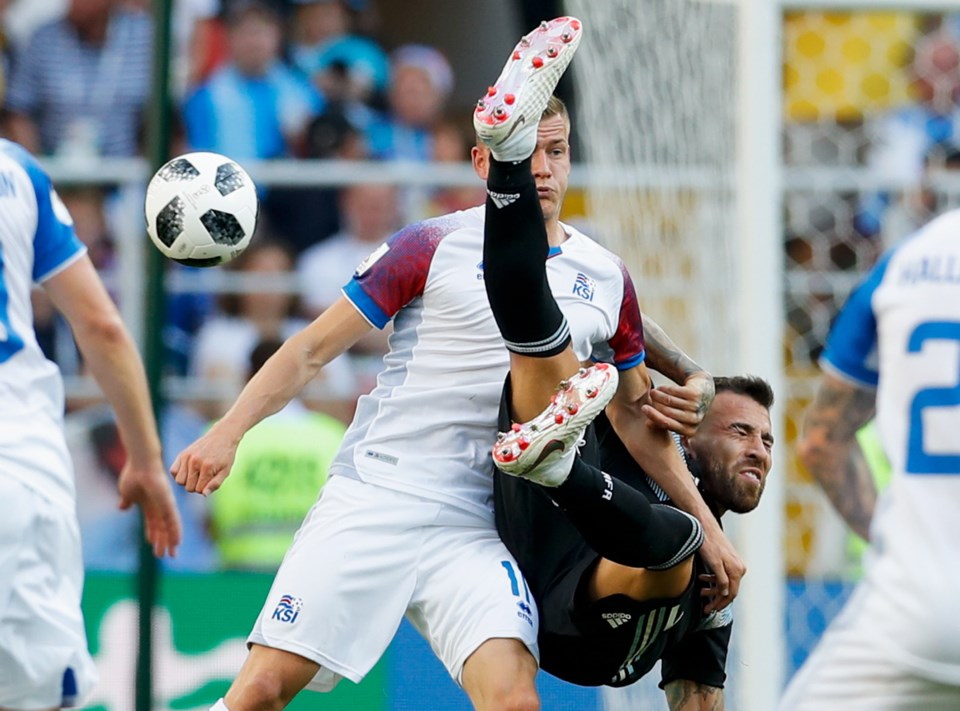 ‘It’s Father’s Day,” she said. “Let’s celebrate by you mowing the lawn.”
‘It’s Father’s Day,” she said. “Let’s celebrate by you mowing the lawn.”
“No,” I said, eyes glued to the screen. “The World Cup of Futbol is on.”
“Futbol?”
“Si,” I said. “Serbia was up one-nil at the half but Costa Rica equalized on the hour.”
> More World Cup soccer coverage
This is the way we talk, once every four years when the monthlong World Cup begins, as it has in Russia. Canadian hockey hosers who don’t know their Arsenals from their elbows turn into instant soccer experts and flag-waving patriots.
Of course, they have to wave the flag of the old country — England or Japan or Mexico — since Canada doesn’t have a team in the 32-country tournament. Canada has made it this far just once, in 1986. Mostly we get knocked out early in the qualifying stage, usually by a poor, tiny Central American country where the CIA overthrows the government at halftime. Canada is to men’s soccer what Trump is to humility.
Our women’s team is ranked highly, fourth in the world, but our men wallow in 79th place, just ahead of Curacao, Uganda, Congo and Oman, as in “Oh, man, how can a country with almost 800,000 registered players suck so badly on the world stage?”
My theory is 800,000 players equals 1.6 million parents who collectively spent 42,576 years shivering on the rain-drenched sidelines, and who would rather go bobbing for french fries in the concession stand deep fryer than spend one more soul-sucking minute at a sock-soaking game after Junior turns 14.
This is in contrast to the British, who refuse to watch a match unless they’re being drenched by a steady, icy drizzle falling from a gunmetal sky. (“I never worried about hooligans,” an English acquaintance once said, “as much as I worried about someone rolling up a newspaper and peeing in my overcoat pocket.”)
So, no, with a couple of rare exception such as the Vancouver Whitecaps, Canadians don’t see soccer as a spectator sport. Rather, its purpose, as any soccer parent can tell you, is to raise money, mostly through bottle drives, car washes and the sale of chocolate almonds outside grocery stores (particularly good players, those who sell chocolate almonds by the case, might find themselves competing at the national level).
Basically, Canadians see soccer as a form of recreation for children (the great majority of our players are kids) while the rest of the world views it as a substitute for armed conflict — tribalism in cleats. (When we lived in England, my wife was almost fired from her London workplace for referring to the Queens Park Rangers’ 1986 League Cup semifinal with Liverpool as “just a game.” Happily, her colleagues did eventually warm to her again, even — I’m not making this up — offering to teach her how to make petrol bombs, a kindness she declined.)
To understand the depth of the emotion that the rest of the world invests in this game, just watch a Spanish-language broadcast. When someone scores, the announcer empties his soul like Marlon Brando wailing for Stella in A Streetcar Named Desire: “GOOOAAALLLLLLLL!” It comes out like an extended howl of despair, the kind of noise you make when the toilet roll is empty, or the Canucks sign another 35-year-old to a six-year contract.
Just in case you didn’t get it the first time, the announcer repeats himself: “Go-go-go-go-go GOOOAAALLLLLLLL!” This is followed by a rapid-fire burst of excited Spanish, like Javier Bardem barking his shin on the coffee table.
We got a taste of that passion in 2007 when Victoria hosted part of the under-20 World Cup. Alas, the thunderous drumming and energetic dancing of the Nigerian fans proved so alarming to Royal Athletic Park’s neighbours — who apparently had never before heard people making noise at a sporting event — that organizers actually asked the visitors to keep it down.
That, in turn, spurred the Nigerian media — who were unfamiliar with the bovine placidity of the typical Canadian sports fan, who sits mutely on his hands even as the electronic scoreboard desperately exhorts him to please, please, please make some noise — to rip Victoria in print. The drums were allowed back after the Nigerian Football Association complained to FIFA, but by then Victoria had cemented its reputation as the City That Fun Forgot.
Which brings us — finally — to the point. It was announced this week that the 2026 World Cup will be hosted by the U.S., Mexico and — gasp! — Canada. Really. That’s like the Country Music Awards being shared by Nashville, Austin and Moscow. What are the chances of us pulling this off without, to borrow a football phrase, scoring an own goal?
“Chin up,” I told her. “Canada has a rising young team. A new pro league is coming. We have eight years to learn this stuff before the lads take to the pitch.”
“Awesome,” she said. “What’s a pitch?”



